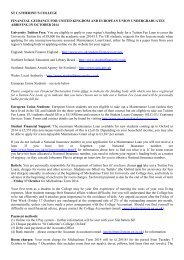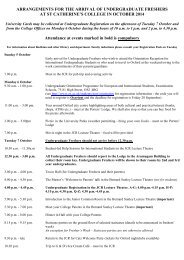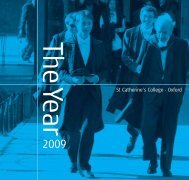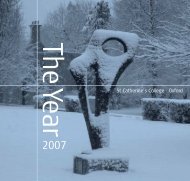Download PDF - St. Catherine's College - University of Oxford
Download PDF - St. Catherine's College - University of Oxford
Download PDF - St. Catherine's College - University of Oxford
You also want an ePaper? Increase the reach of your titles
YUMPU automatically turns print PDFs into web optimized ePapers that Google loves.
Sally Francis (1990, Biology) on her passion for, and work with, saffron<br />
My passion is plants, especially those <strong>of</strong><br />
current or historical economic importance.<br />
After a first degree in Botany, I stayed on at<br />
the Department <strong>of</strong> Plant Sciences in <strong>Oxford</strong> for<br />
my DPhil in barley powdery mildew disease. I<br />
worked in agricultural research for some years,<br />
then took the decision to become a selfemployed<br />
writer and consultant specialising in<br />
crops. My first major undertaking was writing,<br />
illustrating and publishing British Field Crops, a<br />
book which has become the standard text on<br />
the subject. I am involved in many interesting<br />
freelance projects, including scoping studies<br />
on ‘alternative crops’ for cultivation in the UK.<br />
More recently I have added a new venture. I will<br />
hazard a guess that this particular pr<strong>of</strong>ession<br />
is unique amongst Catz alumni: I am a saffron<br />
grower.<br />
My saffron enterprise began because <strong>of</strong> a<br />
birthday present <strong>of</strong> just twenty plants back<br />
in 1997. After many years <strong>of</strong> growing a<br />
little saffron in the garden at my parents’<br />
smallholding in North Norfolk, I<br />
discovered by chance that a<br />
completely forgotten, but highly<br />
important, saffron-growing<br />
industry had once operated in<br />
nearby villages. Saffron from<br />
Norfolk was held in high esteem<br />
both in Britain and overseas.<br />
Valuable consignments <strong>of</strong> the spice were<br />
regularly exported from Norfolk ports like Wellsnext-the-Sea<br />
(where I had gone to school) to<br />
the Low Countries in the early seventeenth<br />
century, though a paucity <strong>of</strong> surviving customs<br />
records means we only have the merest<br />
glimpse into this intriguing trade.<br />
In 2009 I started transforming my hobbygrowing<br />
into commercial production. It required<br />
all my botanical and farming expertise to<br />
develop agronomy techniques that would allow<br />
the plant to be grown in field conditions, rather<br />
than a very sheltered garden, and to produce<br />
an economically viable amount <strong>of</strong> saffron per<br />
woman-hour invested. There were masses<br />
<strong>of</strong> technical challenges to overcome, but my<br />
first small field-grown harvest was gathered<br />
in 2010. The following year I applied for Rural<br />
Development Programme funding to help<br />
buy more stock, design and make bespoke<br />
machinery, as well as produce Saffron: the<br />
<strong>St</strong>ory <strong>of</strong> England’s Red Gold. Researching<br />
this book revealed the specialist vocabulary<br />
used by the crokers (saffron growers)<br />
from the Tudor period until saffron’s<br />
abandonment in England in the 1820s.<br />
Saffron is not an easy crop to grow and<br />
the associated work is very exacting and<br />
painstaking, which I love! Unlike most<br />
other crops, saffron has defied mechanisation<br />
and is still grown in a similar way to when it<br />
was first domesticated in Bronze Age Crete.<br />
It is exceptionally labour-intensive and huge<br />
amounts <strong>of</strong> work are needed to grow even a<br />
tiny area, so I do not operate on the same scale<br />
as other farmers. Harvesting is only possible by<br />
hand. Between 150 and 200 flowers are needed<br />
to yield just one gram <strong>of</strong> dried product, which is<br />
why saffron comes at a price.<br />
My focus for my business, Norfolk Saffron,<br />
has been on quality and sustainability. After<br />
much research, I developed a harvesting and<br />
drying method which produces rich, dark red<br />
saffron threads that are as strong and potent<br />
as possible. I only sell saffron from the most<br />
recent harvest, never older stock, which means<br />
the saffron’s superb flavour can be enjoyed to<br />
the full. In recognition <strong>of</strong> this, last year we won<br />
a Gold Great Taste Award. My work is always<br />
interesting and varied, ranging from R&D<br />
experiments to driving the tractor. I enjoy the<br />
seasonal nature <strong>of</strong> saffron growing, meeting<br />
people as passionate about saffron as me, and<br />
above all I love the harvest. It’s just so very<br />
satisfying to grow something useful.<br />
For more information, and for online sales,<br />
please visit: www.norfolksaffron.com and<br />
www.britishfieldcrops.co.uk n<br />
ST CATHERINE’S COLLEGE 2012/45
















